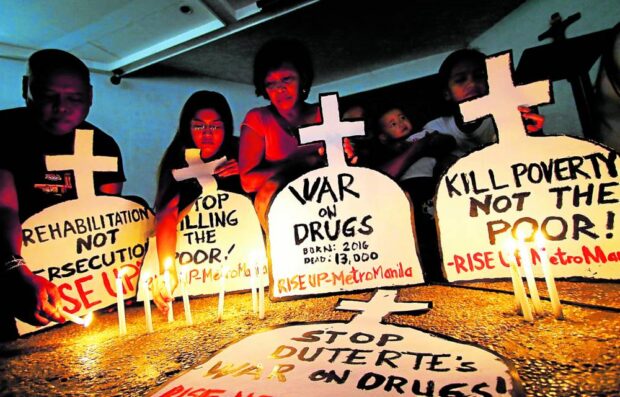Gov’t urged to provide reparations to drug war victims

OF TEARS AND ‘TOKHANG’ | Relatives of victims of extrajudicial killings attributed to the Duterte administration’s war on drugs gather at Caritas Manila’s office in Pandacan, Manila, on All Saints’ Day in 2017. (File photo by RICHARD A. REYES / Philippine Daily Inquirer)
MANILA, Philippines — Beyond cooperating with the International Criminal Court (ICC) and conducting its own investigation into alleged abuses in the conduct of the drug war, the government should also “acknowledge its responsibility” to victims and consider extending reparations and other forms of support to help them regain control of their lives.
This was the opinion expressed by experts familiar with the ICC process in a forum on Friday led by 1Sambayan, in which they also cautioned victims from “pinning all their hopes” for justice on a court that was “far removed from the realities of the Philippines.”
“Victims also need more things other than a trial; they need support,” said Ruben Carranza, former Presidential Commission on Good Government chair and now International Center for Transitional Justice senior expert. “We need to broaden our understanding of justice as something that can also be achieved beyond the courts.”
For example, Carranza said, the government can draft legislation for reparations akin to Republic Act No. 10368, which recognized and provided compensation to martial law victims.
It can also establish programs and policies that provide scholarships and financial and psychosocial support, especially for widows and orphans of those killed in the drug war.
Article continues after this advertisementCarranza cited the example of Mexico, whose president, Andres Manuel Lopez Obrador, established the first truth commission to look into the government’s culpability in the Sept. 26, 2014, disappearance of 43 students before a planned demonstration on the “dirty wars” in the 1970s.
Article continues after this advertisement‘Nonjudicial remedies’
“The ICC is complex and the likelihood is that the defendants will not go before the court even if it ultimately files charges,” Carranza said, referring to the fact that the ICC has no police force to enforce arrests or summons. “Because we know this, we need to establish nonjudicial remedies while we also fight for the case now before the ICC.”
“It’s important not to raise the expectations of victims that the ICC would proceed the way that courts normally proceed,” he added.
His suggestion came after President Marcos acknowledged that there were “abuses” committed in the drug war under his predecessor, former President Rodrigo Duterte.
At present, the ICC is deliberating on the government’s appeal for the international tribunal to stop its investigation into Duterte’s drug war. The country’s lead legal counsels—Justice Secretary Jesus Crispin Remulla, presidential counsel Juan Ponce Enrile and Solicitor General Menardo Guevarra—also said the government would not cooperate with the ICC as the Philippines was no longer under its jurisdiction.
Former ICC judge Raul Pangalangan reminded the government that under Article 127, withdrawal “should not affect cooperation with the court.”
He said the court does not have to wait for the government’s concurrence as civil society and private organizations can help fill the gap by making sure that witnesses are identified and their testimonies are secured.
“We cannot be satisfied purely with big picture reports coming from the [nongovernment organizations], coming from the newspapers. It is important that we marshal the evidence so we can move forward with the cases,” he said. “This is an exercise that civil society groups are well-positioned to help.”